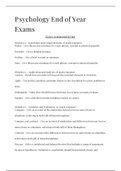Psychology End of Year
Exams
Essay command terms
Objective 1 – Knowledge and Comprehension. (8 mark response)
Define – Give the precise meaning of a word, phrase, concept or physical quantity.
Describe – Give a detailed account.
Outline – Give a brief account or summary.
State – Give the precise meaning of a word, phrase, concept or physical quantity.
Objective 2 – Application and Analysis. (8 mark response)
Analyse – Break down in order to bring out the essential elements or structure.
Apply – Use an idea, equation, principle, theory or law in relation to a given problem or
issue.
Distinguish – Make clear the differences between two or more concepts or items.
Explain – Give a detailed account including reasons or causes.
Objective 3 – Synthesis and Evaluation. (22 mark response)
Compare – Give an account of the similarities between two (or more) items or
situations, referring to both (all) of them throughout.
Compare and contrast – Give an account of similarities and differences between two (or
more) items or situations, referring to both (all) of them throughout.
Contrast – Give an account of the differences between two (or more) items or situations,
referring to both (all) of them throughout.
Discuss – Offer a considered and balanced review that includes a range of arguments,
factors or hypotheses. Opinions or conclusions should be presented clearly and
,supported by appropriate evidence.
Evaluate – Make an appraisal by weighing up the strengths and limitations.
Examine – Consider an argument or concept in a way that uncovers the assumptions
and interrelationships of the issue.
To what extent – Consider the merits or otherwise of an argument or concept. Opinions
and conclusions should be presented clearly and supported with appropriate evidence
and sound argument.
Research methods
Laboratory experiments
Laboratory experiments take place in a psychology lab, usually a special room
set up in a university or research institute.
This type of experiment is conducted in a well-controlled environment (not
necessarily a laboratory), where accurate measurements are possible.
The researcher decides where the experiment will take place, at what time, with
which participants, in what circumstances and using a standardized procedure.
Participants are randomly allocated to each independent variable group.
● Strength: It is easy to control extraneous variables. The psychologist can
make sure that everything in the room stays exactly the same for all
participants. The time of day, furniture, instructions, lighting and so on
can all controlled by the researcher.
● Strength: Since everything about the lab experiment is set in advance, it is
easy for another researcher to replicate (copy) the experiment and
confirm the results
● Limitation: People may not behave the way they normally do when in a
psychology lab, especially since they know they are taking part in a study
and are being observed. If people behave differently during a lab
, experiment than they normally would, then the results from the lab might
not apply to real life
Field experiment
Field experiment takes place in an ordinary, everyday environment, such as on
the street, in a subway station, at a shopping mall, or in a classroom.
Field experiments are done in the everyday (i.e. real life) environment of the
participants. The experimenter still manipulates the independent variable, but
in a real-life setting (so cannot really control extraneous variables).
● Strength: Since the experiment takes place in a natural setting, its more
likely that the behavior of participants will reflect how they would behave
in everyday life
● Limitation: Controlling all extraneous variables is very difficult in a real
life environment. For instance, if you are carrying out your experiment in
a subway station, the environment is constantly changing. One minute
the station might be very crowded, the next minute less so. Or, there
might be different music playing in the background from one minute to
the next.
Natural experiment
Natural experiment is an experiment in which the change in the independent
variable occurs naturally. For instance, imagine two remote islands in the
middle of the Pacific Ocean. One island gets hooked up to satellite TV, while the
other island won't get TV for another few years. That allows researchers to
study the effects of television on behavior.
Natural experiments are conducted in the everyday (i.e. real life) environment of
the participants, but here the experimenter has no control over the IV as it
occurs naturally in real life.
, For example, Hodges and Tizard's attachment research (1989)compared the long
term development of children who have been adopted, fostered or returned to
their mothers with a control group of children who had spent all their lives in
their biological families.
● Strength: Natural experiments are real-life situations, and hence reflect
how people behave in everyday life
● Strength: Natural experiments can be used in situations where it would be
ethically impossible to manipulate the independent variable. For
instance, it would be practically impossible for researchers to withhold
television access to a whole island, just to study TV's effects.
● Limitation: Natural experiments are usually one-time only events, which
are impossible to replicate.
Case study
Case studies are in-depth investigations of a single person, group, event or
community. Typically, data are gathered from a variety of sources and by using
several different methods (e.g. observations & interviews). The research may
also continue for an extended period of time, so processes and developments can
be studied as they happen.
The case study method often involves simply observing what happens to, or
reconstructing ‘the case history’ of a single participant or group of individuals
(such as a school class or a specific social group), i.e. the idiographic approach.
Case studies allow a researcher to investigate a topic in far more detail than





